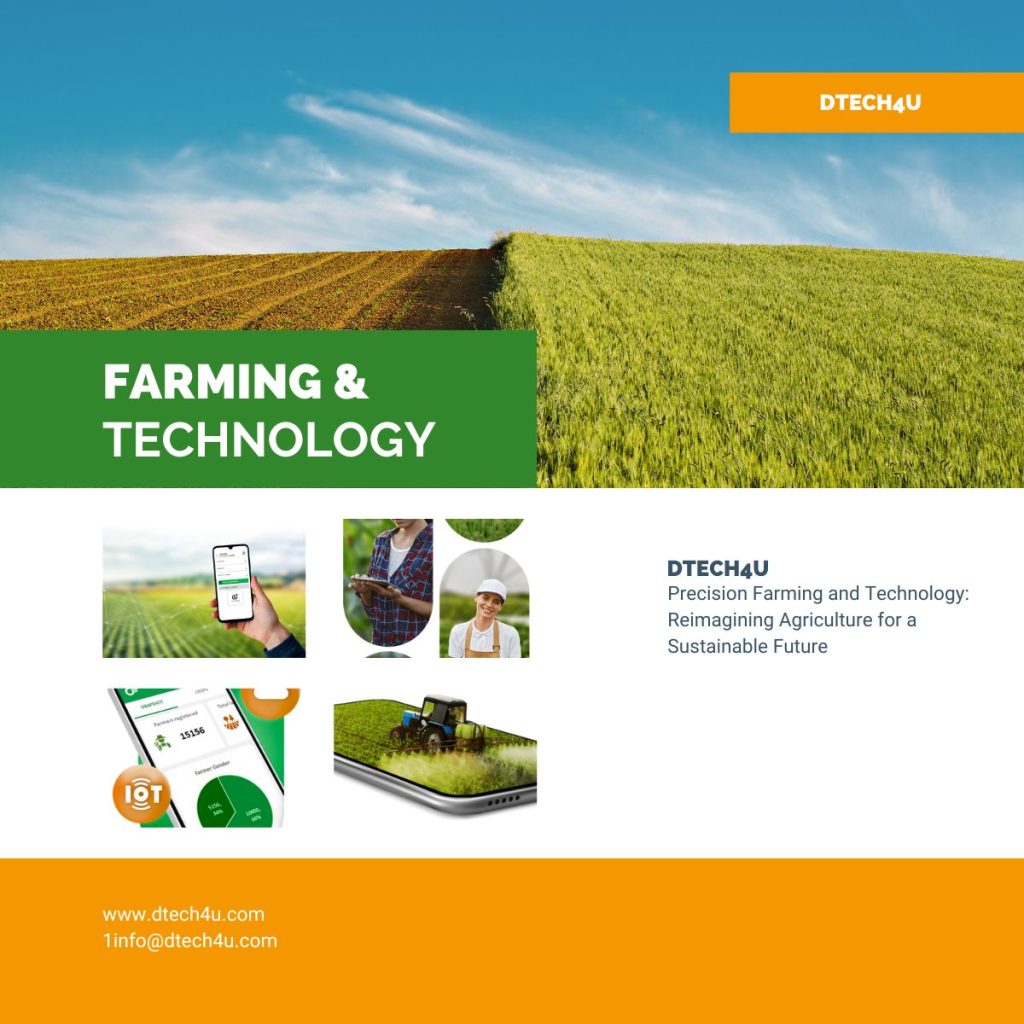also known as precision agriculture, is revolutionizing the agricultural
industry by integrating advanced technologies to optimize farming
practices. By leveraging cutting-edge technologies, such as sensors,
data analytics, and automation, precision farming enables farmers to
make data-driven decisions, maximize crop yield, and minimize
environmental impact. In this article, we will delve into the world of
precision farming and explore how technology is reshaping agriculture
for a sustainable future.
farming is a farming approach that utilizes technology and data to
optimize farming practices at a granular level. It involves the
collection and analysis of various data points, including soil
conditions, weather patterns, crop health, and nutrient levels, to make
precise decisions regarding irrigation, fertilization, and pest
management.
- Remote Sensing: Satellite imagery, drones, and ground-based sensors provide real-time data on crop health, soil moisture, and nutrient levels.
- Global Positioning System (GPS): GPS technology enables accurate mapping and location-based guidance systems for precise field operations.
- Variable Rate Technology (VRT):
VRT allows farmers to apply fertilizers, pesticides, and irrigation
based on specific field conditions, optimizing resource allocation. - Data Analytics: Advanced analytics and machine learning algorithms analyze collected data to provide actionable insights for decision making.
- Automation and Robotics: Automated machinery and robotics perform tasks such as seeding, spraying, and harvesting with precision and efficiency.
- Increased Crop Yield: By precisely tailoring farming practices to specific field conditions, farmers can optimize crop growth and maximize yield.
- Resource Efficiency:
Precision farming minimizes the use of resources such as water,
fertilizers, and pesticides, reducing waste and environmental impact. - Cost Savings: Improved efficiency and optimized resource management lead to cost savings for farmers.
- Environmental Sustainability:
Precision farming practices reduce the environmental footprint of
agriculture by minimizing soil erosion, chemical runoff, and greenhouse
gas emissions.
plays a crucial role in precision farming. Farmers collect and analyze
data from various sources to gain insights into soil conditions, crop
health, and environmental factors. By leveraging data analytics and
predictive models, farmers can make informed decisions about when and
where to apply resources, leading to more efficient and sustainable
farming practices.
farming enables precise targeting of resources such as water,
fertilizers, and pesticides, minimizing waste and optimizing their
usage. By applying resources only where and when needed, farmers can
reduce costs, conserve resources, and minimize the environmental impact
of farming operations.
its focus on optimized resource management, precision farming
contributes to environmental sustainability. By minimizing chemical use,
reducing water consumption, and adopting conservation practices,
precision farming practices help protect biodiversity, preserve soil
health, and mitigate the impact of agriculture on natural ecosystems.
precision farming brings immense benefits, there are challenges to
overcome. These include the initial investment in technology, access to
reliable connectivity in rural areas, and the need for farmers to
acquire the necessary skills and knowledge to adopt and utilize
precision farming techniques effectively. However, as technology
continues to evolve and becomes more accessible, precision farming holds
tremendous potential for addressing the challenges of feeding a growing
global population while minimizing environmental impact.
Q: What is the role of drones in precision farming?
A: Drones equipped with multispectral sensors capture high-resolution imagery, allowing farmers to monitor crop health, detect pest infestations, and identify areas requiring attention.
Q: Can precision farming be applied to small-scale farms?
A: Yes, precision farming practices can be tailored to different farm sizes, including small-scale farms. The technology and practices can be scaled accordingly to optimize productivity.
Q: How does precision farming contribute to water conservation?A: Precision farming techniques, such as soil moisture sensors and precision irrigation systems, ensure water is applied only when and where needed, minimizing water waste and promoting water conservation.
Q: What role does data analytics play in precision farming?
A: Data analytics allows farmers to derive valuable insights from collected data, enabling them to make data-driven decisions regarding crop management, resource allocation, and pest control.
Q: Are there any potential risks associated with precision farming?
A: Challenges include the need for reliable connectivity, data security and privacy concerns, and the requirement for farmers to acquire the necessary skills and knowledge to utilize precision farming technologies effectively.
Q: How does precision farming contribute to sustainable agriculture?
A: Precision farming promotes sustainability by reducing resource use, minimizing environmental impact, and optimizing farming practices to maximize productivity while preserving natural resources.
Precision
farming, empowered by advanced technologies, revolutionizes traditional
farming practices. By utilizing data analytics, automation, and remote
sensing, precision farming enables farmers to make informed decisions,
optimize resource allocation, and minimize environmental impact. As the
world faces the challenges of feeding a growing population and
addressing climate change, precision farming offers a sustainable
solution for maximizing crop yield while conserving resources. Embracing
precision farming practices is crucial to creating a resilient and
sustainable future for agriculture.


